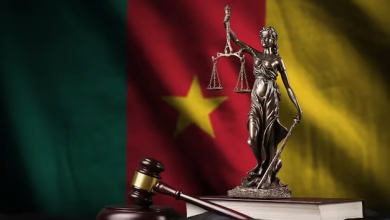Sharia, Commerce, and Technology — The New Frontier in Egyptian Law
By Yasmin Khaled | Legal Africa

Editor’s Note
As Africa’s legal landscape evolves under the weight of innovation and cultural identity, Egypt stands at a unique crossroads where faith, commerce, and technology meet. This feature explores how the country’s legal system is reinterpreting Sharia principles in a rapidly digitalized economy, shaping what could become the new model for Islamic commercial law in Africa.
A New Legal Intersection
Egypt’s legal ecosystem is being reshaped by three powerful forces: Sharia, commerce, and technology.
The country’s 2022 FinTech Law one of the most comprehensive in Africa is ushering in a new era of digital finance, e-commerce, and blockchain regulation. But beneath this innovation lies a deeper question:
How does a legal system rooted in Islamic jurisprudence adapt to a future powered by algorithms, smart contracts, and decentralized finance?
Sharia in Modern Egyptian Law
The Egyptian Constitution places Islamic Sharia as “a principal source of legislation.” Yet, as scholars such as Berger and Sonneveld argue in Sharia and National Law in Egypt, this doesn’t mean religious law operates independently of civil law.
Instead, Egypt has developed what one might call a “layered legal identity” where Sharia influences the spirit and interpretation of law, while statutes and court decisions govern day-to-day practice.
The Supreme Constitutional Court (SCC) has often served as a balancing force, interpreting Sharia-based arguments through the lens of constitutional and commercial pragmatism. This approach is what allows Egypt to maintain a faith-based identity while pursuing economic modernization.
The FinTech Law: A Legal Game Changer
Law No. 5 of 2022, Egypt’s FinTech Law, has become the bedrock for regulating non-banking financial technologies.
It introduces licensing requirements, data protection protocols, and supervisory powers for the Financial Regulatory Authority (FRA) creating legal certainty for digital finance startups.
According to analyses by local law firms and international observers, the FinTech Law is not just a regulatory framework; it’s a signal of trust to investors, startups, and global partners that Egypt intends to lead Africa’s digital finance transformation.
However, innovation in a Sharia-based system is never just technical it’s theological and ethical, too.
Faith Meets Code: Smart Contracts and Islamic Finance
In Cairo’s fintech community, engineers and scholars are exploring how smart contracts, tokenized assets, and Islamic financial instruments can coexist.
Islamic commercial law prohibits riba (interest) and speculative uncertainty (gharar), and demands transparency, shared risk, and mutual consent. These values, interestingly, align with blockchain’s promise of transparency and immutability.
Yet challenges remain.
Can a self-executing code represent a valid aqd (contract) under Islamic law?
Who bears responsibility if a smart contract malfunctions or breaches Sharia principles?
Recent academic papers on smart sukuk (blockchain-based Islamic bonds) suggest possible solutions such as embedding Sharia boards in fintech product design to validate compliance before launch.
“Technology will never replace Sharia, but it can make its values more transparent,” says an Islamic finance lecturer at the American University in Cairo.
The Court’s Evolving Role
Egypt’s Supreme Constitutional Court remains the guardian of the balance between modern law and religious heritage.
Its rulings have shown that judges are willing to interpret statutes in ways that respect Sharia’s essence without hindering innovation.
Legal scholars believe this adaptive jurisprudence will be crucial as cases involving blockchain disputes, electronic evidence, or Islamic digital finance start to appear before the courts.
Africa’s Next Legal Template?
Egypt’s legal evolution offers lessons for the continent.
Countries such as Nigeria, Sudan, and Kenya each with growing Islamic finance markets are observing how Cairo integrates faith and fintech. If successful, Egypt’s approach could serve as a Pan-African template for harmonizing religious values with digital transformation.
The Way Forward
For this balance to hold, Egypt’s policymakers, scholars, and tech innovators must continue working together.
-
Regulators should publish clearer rules for smart contracts and digital evidence.
-
Courts must interpret new technologies with flexibility and fairness.
-
Developers should design fintech tools that reflect not only profitability but ethical and spiritual accountability.
If done well, Egypt will not just modernize its economy it will redefine how Sharia principles guide digital trade across Africa.
Closing Thought
Egypt’s story is not about replacing the sacred with the technical.
It is about translating timeless principles into modern practice where Sharia, commerce, and technology form not a clash, but a convergence.
Sources and Further Reading
-
Law No. 5 of 2022 (FinTech Law) — Financial Regulatory Authority (Egypt).
-
Berger, M. & Sonneveld, N. Sharia and National Law in Egypt, in Sharia Incorporated (Leiden University Press).
-
The Egyptian Supreme Constitutional Court’s Interpretation of the Islamic Sharia as a Constitutional Check — IACL Blog.
-
FinTech Laws & Regulations: Egypt — ICLG and Legal500 Country Reports (2025).
-
Blockchain and Smart Contracts in Islamic Finance — recent academic working papers (AUC / SSRN).
-
Andersen Legal — E-commerce and the Law: How Egypt is Shaping its Digital Economy.




